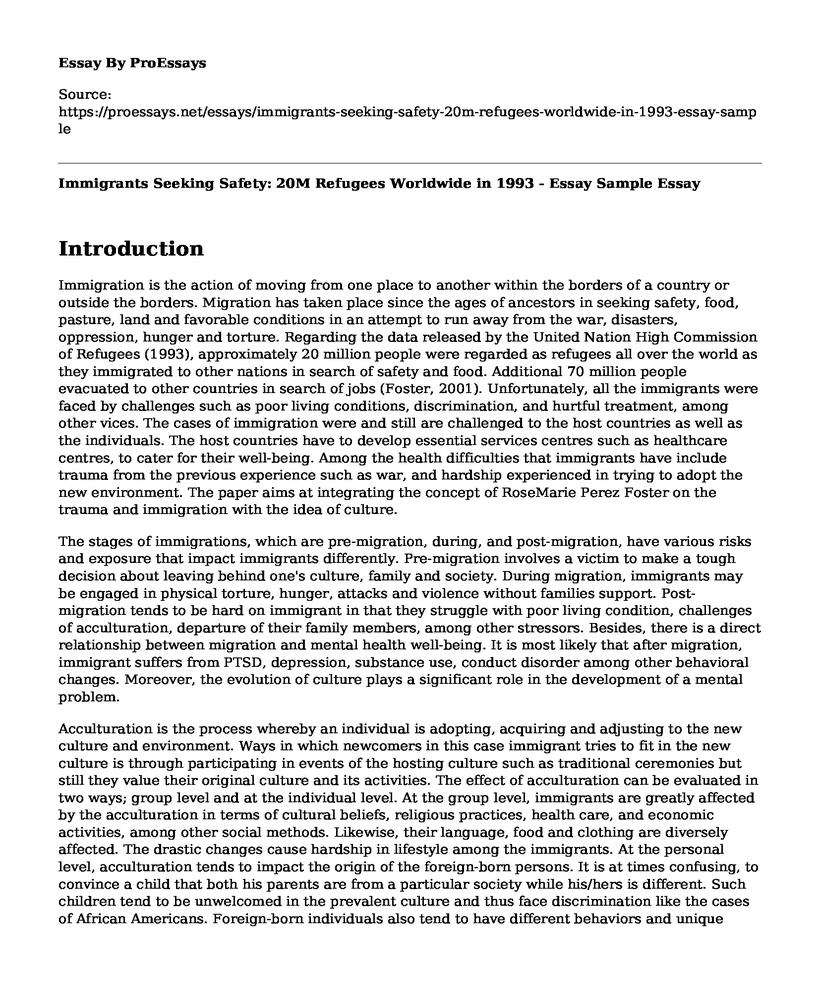Introduction
Immigration is the action of moving from one place to another within the borders of a country or outside the borders. Migration has taken place since the ages of ancestors in seeking safety, food, pasture, land and favorable conditions in an attempt to run away from the war, disasters, oppression, hunger and torture. Regarding the data released by the United Nation High Commission of Refugees (1993), approximately 20 million people were regarded as refugees all over the world as they immigrated to other nations in search of safety and food. Additional 70 million people evacuated to other countries in search of jobs (Foster, 2001). Unfortunately, all the immigrants were faced by challenges such as poor living conditions, discrimination, and hurtful treatment, among other vices. The cases of immigration were and still are challenged to the host countries as well as the individuals. The host countries have to develop essential services centres such as healthcare centres, to cater for their well-being. Among the health difficulties that immigrants have include trauma from the previous experience such as war, and hardship experienced in trying to adopt the new environment. The paper aims at integrating the concept of RoseMarie Perez Foster on the trauma and immigration with the idea of culture.
The stages of immigrations, which are pre-migration, during, and post-migration, have various risks and exposure that impact immigrants differently. Pre-migration involves a victim to make a tough decision about leaving behind one's culture, family and society. During migration, immigrants may be engaged in physical torture, hunger, attacks and violence without families support. Post-migration tends to be hard on immigrant in that they struggle with poor living condition, challenges of acculturation, departure of their family members, among other stressors. Besides, there is a direct relationship between migration and mental health well-being. It is most likely that after migration, immigrant suffers from PTSD, depression, substance use, conduct disorder among other behavioral changes. Moreover, the evolution of culture plays a significant role in the development of a mental problem.
Acculturation is the process whereby an individual is adopting, acquiring and adjusting to the new culture and environment. Ways in which newcomers in this case immigrant tries to fit in the new culture is through participating in events of the hosting culture such as traditional ceremonies but still they value their original culture and its activities. The effect of acculturation can be evaluated in two ways; group level and at the individual level. At the group level, immigrants are greatly affected by the acculturation in terms of cultural beliefs, religious practices, health care, and economic activities, among other social methods. Likewise, their language, food and clothing are diversely affected. The drastic changes cause hardship in lifestyle among the immigrants. At the personal level, acculturation tends to impact the origin of the foreign-born persons. It is at times confusing, to convince a child that both his parents are from a particular society while his/hers is different. Such children tend to be unwelcomed in the prevalent culture and thus face discrimination like the cases of African Americans. Foreign-born individuals also tend to have different behaviors and unique traits, both physically and psychological, which diversely affect their confidence and self-esteem.
In the effort to reduce the effects of cultures on the immigrants, and an integration model is a consistent approach through not accurate. The rate at which the newcomers take to interact with the hosting culture positively will determine the intensity of the impact on them. For instance, boys are found to have relatively low acculturation effect as compared to immigrant girls due to their ability to socialize easily with other people. However, factors such as resistance between two cultures and the degree of integration difficulty limit the integration among immigrant and hosts.
References
Foster, R. P. (2001). When immigration is trauma: Guidelines for the individual and family clinician. American Journal of Orthopsychiatry, 71(2), 153-170.
Cite this page
Immigrants Seeking Safety: 20M Refugees Worldwide in 1993 - Essay Sample. (2023, May 25). Retrieved from https://proessays.net/essays/immigrants-seeking-safety-20m-refugees-worldwide-in-1993-essay-sample
If you are the original author of this essay and no longer wish to have it published on the ProEssays website, please click below to request its removal:
- History of Irish in America Essay
- Was John Brown a Terrorist? Essay Example
- Essay Example on Microfinance: Alleviating Poverty Through Financial Inclusion
- Essay Sample on Loot Boxes: A Growing Challenge to Our Society
- Quantitative Research: Benefits for Examining Childhood Obesity & PICOT
- Essay Example on Bullying: Power Dynamics & Its Impact on Society
- Essay Example on Day at Domestic Violence Shelter: Compassion and Understanding







